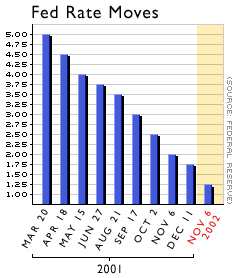NEW YORK (CNN/Money) -
Federal Reserve Chairman Alan Greenspan said Wednesday that the U.S. economy has hit a soft spot but that the Fed's recent rate cut should keep the economy from sliding into recession.
The central bank chairman, in prepared remarks delivered to the Joint Economic Committee of the House and the Senate, said concerns about a possible war in Iraq, corporate accounting scandals and falling stock prices had cut into the spending of consumers, who fuel more than two-thirds of the economy, while business spending continues to be weak.
"Over the last few months, these forces have taken their toll on activity, and evidence has accumulated that the economy has hit a soft patch," Greenspan said.

But he added that the economy's recent productivity gains and the Fed's dramatic rate cut last week should help keep the economy growing.
Greenspan also noted, however, that "history does raise some warning flags" that the strong productivity growth of the late 1990s and early 2000s might not last much longer. Greenspan said he and other policy makers needed to keep an eye on the "evolution of productivity."
Stock prices fell early in Greenspan's testimony, but later turned positive. Bond prices were mostly lower.
Stock investors may have been cheered when Greenspan, in response to a lawmaker's question, said that the Fed wouldn't hesitate to cut rates again if it saw continuing weakness, though he doubted more stimulus would be necessary.
| 
| |

| 
| 
|

|
 Federal Reserve Chairman Alan Greenspan, testifying before the Joint Economic Committee, said the economy has hit a soft spot. CNNfn's Kathleen Hays reports. Federal Reserve Chairman Alan Greenspan, testifying before the Joint Economic Committee, said the economy has hit a soft spot. CNNfn's Kathleen Hays reports.
|
|
Play video
(QuickTime, Real or Windows Media)
|
| 
|

|
|
"We remain of the view that the Fed's near-term objective is simply to support the stock market until consumer and business sentiment improves," said Ian Shepherdson, chief U.S. economist at High Frequency Economics Ltd.
Last week, the Fed slashed its target for a key short-term interest rate to a new 40-year low, hoping banks would cut the cost of borrowing, giving consumers -- whose spending fuels two-thirds of the economy -- more cash to spend.
In an unusual move, the Fed also pronounced that the risks to the economy were evenly balanced between further economic weakness and inflation. It was a signal that policy makers didn't plan to cut rates again for quite a while, though Greenspan's comments Wednesday indicated the Fed was still willing to act.
In response to a question from the committee chairman, Rep. Jim Saxton, R-N.J., Greenspan addressed the concerns of some economists that, with interest rates near rock bottom, the Fed was running out of ammunition to fight recession, saying the chances were "extraordinarily remote" that the Fed would take its target for its key overnight lending rate down to zero.
Even in the unlikely event the Fed did need to take more exotic measures to fuel the economy, it could buy longer-term bonds to help bring long-term interest rates lower, as it did during World War II and until 1951, Greenspan said.
| Related stories
|

|
|
|
|
Some economists think the Fed might have made its latest rate cut with a nervous eye on the prospect of deflation, a grim, unstoppable downward slide of prices that erodes corporate profits, discouraging production and hiring. Japan's been in such a morass for several years, and the Fed certainly wants to avoid the same trap.
In answer to another question from Saxton, Greenspan said that while companies are having a hard time raising prices, the risk of deflation is remote.
"We are very consciously aware that we cannot allow [deflation] to creep up on us unseen, so we put a lot of resources in examining and reevaluating this conclusion all the time," Greenspan said. "But we are not close to a deflationary cliff."
Many economists believe that the Fed might be losing effectiveness with interest rates and inflation so low and are turning to Congress to provide fiscal economic stimulus.
Greenspan said he hoped Congress would maintain fiscal discipline and be careful to think of the long-term implications of short-term stimulus packages.
One bill President Bush would like to see passed is one making last year's tax cut permanent. Greenspan said he thought U.S. markets were already assuming that tax cut would be made permanent and would be alarmed to find out they weren't.
Greenspan's support helped cement passage of the tax cut last year, and some economists have complained that the central bank chairman has overstepped his bounds and should comment only on monetary policy and its effects.
"Greenspan has done a good job of morphing himself into the nation's chief economic officer and chief investment officer," said fixed income analyst Jim Bianco, president of Bianco Research in Chicago. "He's been elevated to the status where we can't cut taxes unless Greenspan says we can cut them."

|

